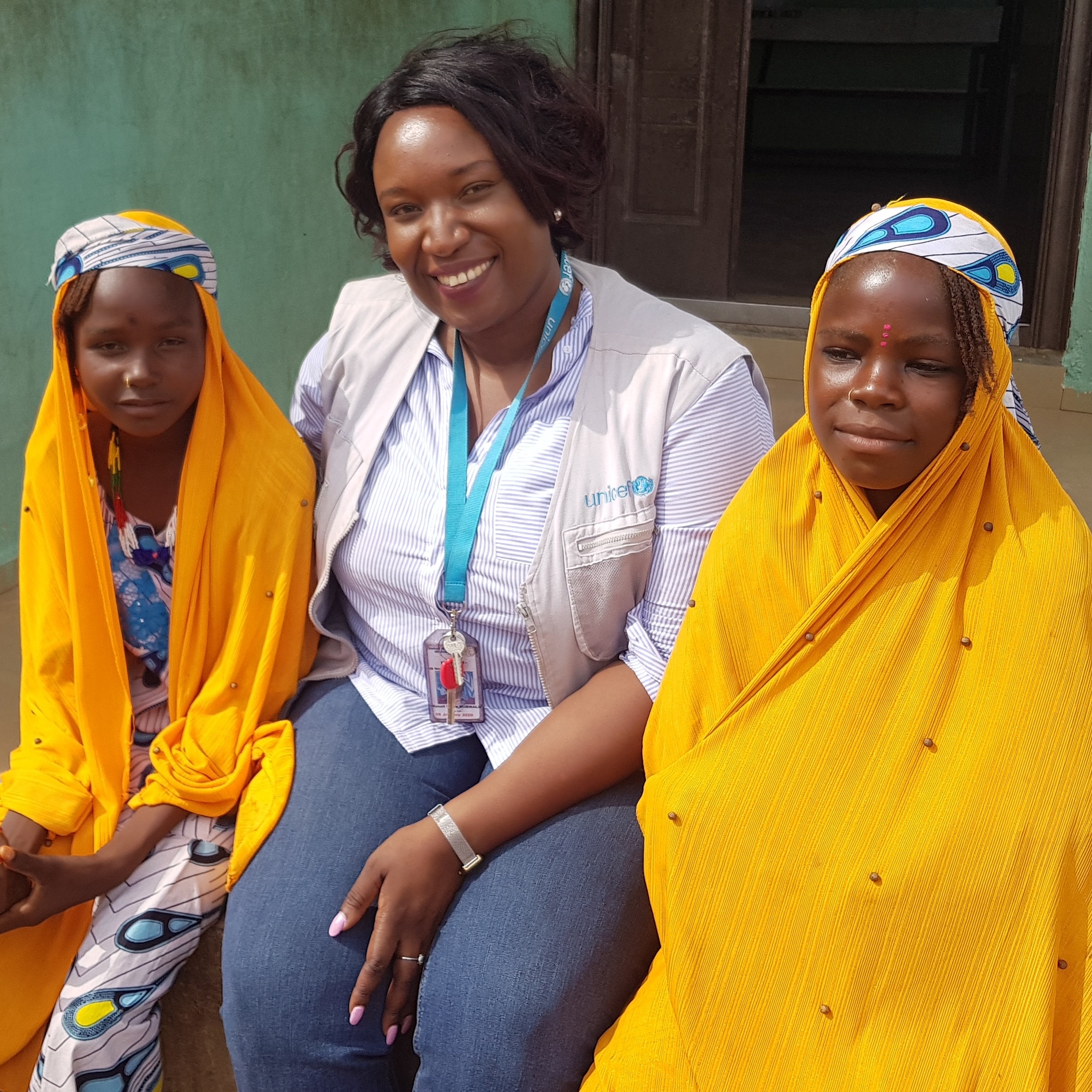On International Day of the Girl we think about incredible girls and women and all they are achieving, often against the odds. UNICEF field workers meet girls who have endured the most appalling struggles every day. We are proud to watch them transform and be reborn, given the right supports. Here, Communciation Specialist with UNICEF Nigeria, Kusali Kubwalo reflects on 15-year-old Aisha’s story of abduction, violence and triumph.

At Konduga Camp for displaced persons in north east Nigeria, UNICEF Nigeria Communication Specialist Kusali Kubwalo chats with two girls who are cousins and dream of becoming fashion designers.‘Brave girls like Aisha rekindle the fire in me every day.’
By Kusali Kubwalo
Communication Specialist, UNICEF Nigeria
I still remember the day I met Aisha, a 15-year-old girl living in Muna Garage camp for displaced people in north-east Nigeria, in March 2018. She had just been reunited with her long lost aunt after spending years in captivity. Aisha had been abducted by an armed group. She was visibly mentally and physically broken. When she spoke, her words were inaudible, punctuated by tears and long painful silences. On that day the only thing she was able to communicate was her age and name.
UNICEF support
A few months later, I returned to the camp to interview children who had suffered violence and abuse whilst in captivity and were now accessing life skills and psychosocial support from UNICEF. As a Communication Specialist, I interviewed these children over a period of three weeks. When you work in these situations you come to learn very quickly, the real story does not come out on the first or second day, it comes out only after trust has been built between you and the child.
Haunted eyes
For Aisha, it took some time, more than those initial three weeks.
Over a period of four months, I went to the camp for other issues but made a point of visiting her. Every time, she shared a bit of her painful experience in captivity. Every time, the haunted look in her eyes, gave me many sleepless nights.
In bits and pieces, Aisha told me that she had been abducted when she was ten in broad daylight. They had attacked her village, killed her father in her presence, and took her and others away. This particular abduction did not make it to the international news, it did not even make it to the local radio station. She was forcefully married, repeatedly raped and discarded when she got pregnant. The violence Aisha suffered at the hands of her abductors left her with a permanently broken jaw, a ruptured uterus and no hope.
The violence Aisha suffered at the hands of her abductors left her with a permanently broken jaw, a ruptured uterus and no hope.
Recently, I went back to Muna Garage Camp and found her and other girls learning to make dresses, as part of UNICEF’s support to not only empower them but to reintegrate them back into society. Aisha, who had told me her story amidst sobs a year prior, smiled at me. Yes, she smiled and made my day.
Aisha’s smile
Aisha’s smile and that of many other children who have been affected by conflicts is the reason why I do this job. I get to hear and share their harrowing and heart-breaking stories. When the women and children are telling me their stories, sometimes I cry with them and at other times I cry alone. But I cry. That is the only way I can share in their pain.
Why do this?
It is hard for them to tell me their stories and it is harder for me to write them. But it is very important for the World to know what children and adolescents in conflict affected countries are going through. When their stories are heard, maybe the gatekeepers will allow us access to support others in similar situations. When they are heard, maybe the donors will commit more longer-term resources to support their needs and reintegration. When they are heard, maybe the parties to the conflict will stop targeting civilians, children, schools and critical infrastructure. Maybe.
Workers’ fear
On International Day of the Girl, I am encouraged by brave girls like Aisha who are unstoppable. They encourage me to continue to face my own fears and keep going every day.
Like Aisha, every day, I fear being kidnapped when in the deep field – areas that are only accessible by air. I fear being attacked at night when I overnight in the field and the helicopter has long gone back to base. I fear an explosive device going off when a young girl rushes to hug me. And, it’s lonely going back to an empty room and only seeing my family every six or seven weeks. It’s hard meeting women my age and knowing I can only do so much.
Hang on to hope
But we must hang on to hope.
It is about time we stopped looking at girls and women with a focus on their vulnerability. Let’s shift the narrative from women’s and girls’ vulnerability to their resilience, strength and compassion.
I do this job because someone must do it. When I have made a girl like Aisha smile, I go to sleep knowing that we can indeed change the world one life at a time! There are thousands of brave girls out there needing their stories to be told.
I will tell their stories.

